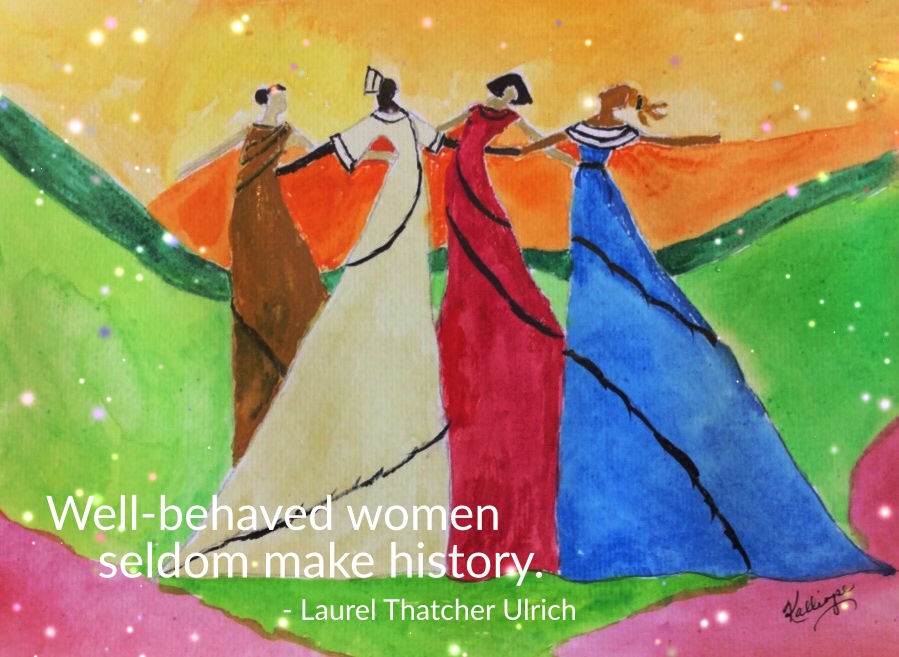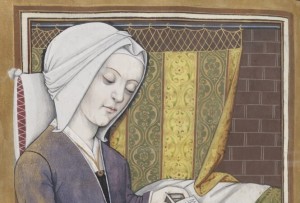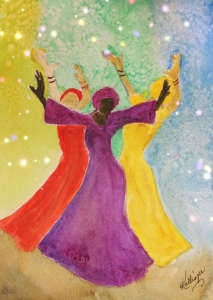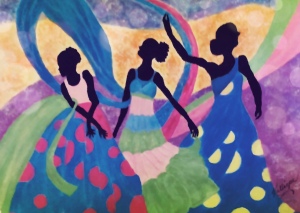
She described herself as an unruly woman of God — Mechthild of Magdeburg. “I want also to circle higher still,” she wrote in one of her mystical poems. She had her first vision of the Holy Spirit at the age of twelve. As a young woman, she left her home and “renounced worldly honour and worldly riches.” She was an ascetic, a writer and a mystic who viewed God’s will in unorthodox ways. Her criticism of church dignitaries for religious laxity and claims to theological insight aroused so much opposition that some called for the burning of her writings. Her words seemed to have kept her in deep trouble!
Her story reminded me of Sue Monk Kidd’s book, “The Dance of the Dissident Daughter,” a book that set me on a pilgrimage in 1996 that changed my life. This was a book that screamed out to me, “Find your own soul! Nourish it! Protect it! Bind it closer to God’s soul and, for the first time, live out God’s call to you!”
Sue Monk Kidd said this as she reflected on writing the book’s first edition:
“The Dance of the Dissident Daughter” sparked heated, sometimes scathing reactions, including public accusations of heresy, boycotts of my lectures, and a plethora of derisive letters in my mailbox. One of the more memorable began: Dear Whore of Babylon. It was the “Dear” part that made is so indelible.
This statement rings true when I contemplate the life of Mechthild of Magdeburg. Before we get back to her, though, let’s look for a moment at The Dance of the Dissident Daughter, the book that left me with these nuggets of wisdom I will always hold close.
How many times have I denied my innermost wisdom and silenced this voice? How many times can a woman betray her soul before it gives up and ceases calling to her at all?
We must wake up, journey, name, challenge, shed, reclaim, ground, and heal.
When someone tries to put you back into a box from which you’ve already escaped, you might recall a line from the Indian poet Mirabai. She said, “I have felt the swaying of the elephant’s shoulders and now you want me to climb on a jackass? Try to be serious!}
As women we have a right to ask the hard questions. The only way I have ever understood, broken free, emerged, healed, forgiven, flourished, and grown powerful is by asking the hardest questions and then living into the answers through opening up to my own terror and transmuting it into creativity. I have gotten nowhere by retreating into hand-me-down sureties or resisting the tensions that truth ignited.
The main thing is to stop struggling and nourish yourself. When you nourish yourself, your creative energy is renewed. You are able to pick up your lyre again and sing.
— Sue Monk Kidd, The Dance of the Dissident Daughter
Yes! Sing, and even dance your dissident dance! Your song may sound to all those around you like a revolutionary song, discordant to their ears. Your dancing may scandalize your observers. Still — Sing! Dance! — to the stirrings of Spirit within you!
 That’s exactly what Mechthild of Magdeburg did and the religious world labeled her unruly. In her book, Das fließende Licht der Gottheit (The Flowing Light of Divinity), she described her visions of God. She could not read and write in Latin, but she is known for being the first mystic to write in German. Her confessor, Heinrich von Halle, finally persuaded her in 1250 to write down her visions and spiritual experiences. She did this in her own hand, in the conviction that it was God’s will.
That’s exactly what Mechthild of Magdeburg did and the religious world labeled her unruly. In her book, Das fließende Licht der Gottheit (The Flowing Light of Divinity), she described her visions of God. She could not read and write in Latin, but she is known for being the first mystic to write in German. Her confessor, Heinrich von Halle, finally persuaded her in 1250 to write down her visions and spiritual experiences. She did this in her own hand, in the conviction that it was God’s will.
By 1270, six of the seven books of the “Flowing Light” were brought to parchment, collected and given chapter titles by Heinrich. Mechthild saw her book as a message to both believers and clergy, for she feared the church was in danger of being hollowed out from within; she called the powerful church officials, who often enjoyed worldly luxury, “stinking billy-goats.”
Thus, Mechthild was known as a very unruly woman of God — a defiant, dissident and radical rebel! “Stinking billy-goats!” No wonder she became known for her “rebelliousness and unorthodox ways.” The community she was a part of, the Beguine order, was known for the same kind of unorthodox rebelliousness.
The Beguine order was a Christian religious movement active in Northern Europe during the 13th-16th centuries. The Beguines were women who lived as nuns in semi-monastic communities. Through their intense devotion to God and their somewhat ascetic lifestyle, they came to be known for their acts of rebellion and their unorthodox ways.

Mechthild of Magdeburg definitely danced to her own music!
With her order, she was part of a great spiritual revival movement of the thirteenth century, a time when the Catholic Church was falling into disfavor. The Beguines sought to imitate the life Christ through voluntary poverty, care of the poor and sick, and religious devotion.
With advancing age, Mechthild was blind. She was alone, still the object of much criticism. With singing silenced and dancing impossible, she was left to sing songs in her heart and dance the dances of her imagination, always seeking Spirit promptings.
Some scholars have speculated that, due to increased persecution and failing health, Mechthild was forced to retire to the convent of Helfta around 1270. There, she met three other notable writers of the time, Gertrude of Hackeborne, Mechthild of Hackeborne, and Gertrude the Great. Helfta was a good place for a writer such as Mechthild. Under the leadership of Gertrude of Hackeborne, Helfta had become a hub of learning and writing for women and a center for book collecting, copying and illumination.
Still, Mechthild portrayed herself as a reluctant writer urged on by God and her director to continue her work. She calls her director “my dear schoolmaster,” who taught her, “simple and stupid as I am, to write this book.” About the urging of God she said, “I cannot nor do I wish to write “unless feeling the power of the Holy Spirit.” At one point, Mechthild wondered why God did not choose a priest rather than herself for this work, and she is told that God always seeks out the lowest and smallest so that “unlearned lips can teach the learned tongues of the Holy Spirit.”
In spite of the fact that Mechthild was unable to read and write in Latin, these are some powerful quotes by the graceful mystic Mechthild of Magdeburg, from her book Das fließende Licht der Gottheit (The Flowing Light of Divinity), where she describes her visions of God.
The day of my spiritual awakening was the day I saw and knew I saw all things in God and God in all things.
If you love the justice of Jesus Christ more than you fear human judgment then you will seek to do compassion. Compassion means that if I see my friend and my enemy in equal need, I shall help them both equally. Justice demands that we seek and find the stranger, the broken, the prisoner and comfort them and offer them our help. Here lies the holy compassion of God that causes the devils much distress.
From suffering I have learned this: that whoever is sore wounded by love will never be made whole unless she embraces the very same love which wounded her.
A Light of utmost splendor glows on the eyes of my soul. Therein have I seen the inexpressible ordering of all things, and recognized God’s unspeakable glory — that incomprehensible wonder — the tender caress between God and the soul . . . the unmingled joy of union, the living love of eternity as it now is and evermore shall be.
I cannot dance, Lord,
unless you lead me.
If you want me to leap with abandon,
You must intone the song.
Then I shall leap into love,
From love into knowledge,
From knowledge into enjoyment,
And from enjoyment
beyond all human sensations.
There I want to remain,
yet want also to circle higher still.
— Mechthild of Magdeburg
Like her, I want to “circle higher still.” I want to escape from chains that shackle the highest expression of my spirit. I want to sing the songs God placed in my heart! I want to dance to the Spirit’s rhythm hidden in my spirit!

Without fear! Without fear . . .
taking the journey set before me to follow Christ into places of poverty, fear, sickness, desperation. Breaking the rules if I must. Taking criticism if I must. Being persecuted if that is in the cards for me. I want to move forward into my calling with the Spirit of God upon me . . .
The Spirit of the Lord is upon me,
because he has anointed me
to bring good news to the poor.
He has sent me to proclaim release to the captives
and recovery of sight to the blind,
to let the oppressed go free.
— Luke 4:18 New Revised Standard Version (NRSV)
May God make it so for us. Amen.

Thoughtful reading this morning. Thank you. Oh to sing and dance to the Glory of God. Blessings to you and yours I love you sweet girl.
LikeLike
I love you, too, my sweet friend. It would be so nice to visit with you.
LikeLike
I love you, too, my sweet friend. It would be so nice to visit with you.
LikeLike
What a lovely post
LikeLike
Thanks so much for your comment. It is quite encouraging to hear from people who read my blog.
Best to you. Stay well and safe in this troublesome time.
Kathy
LikeLike